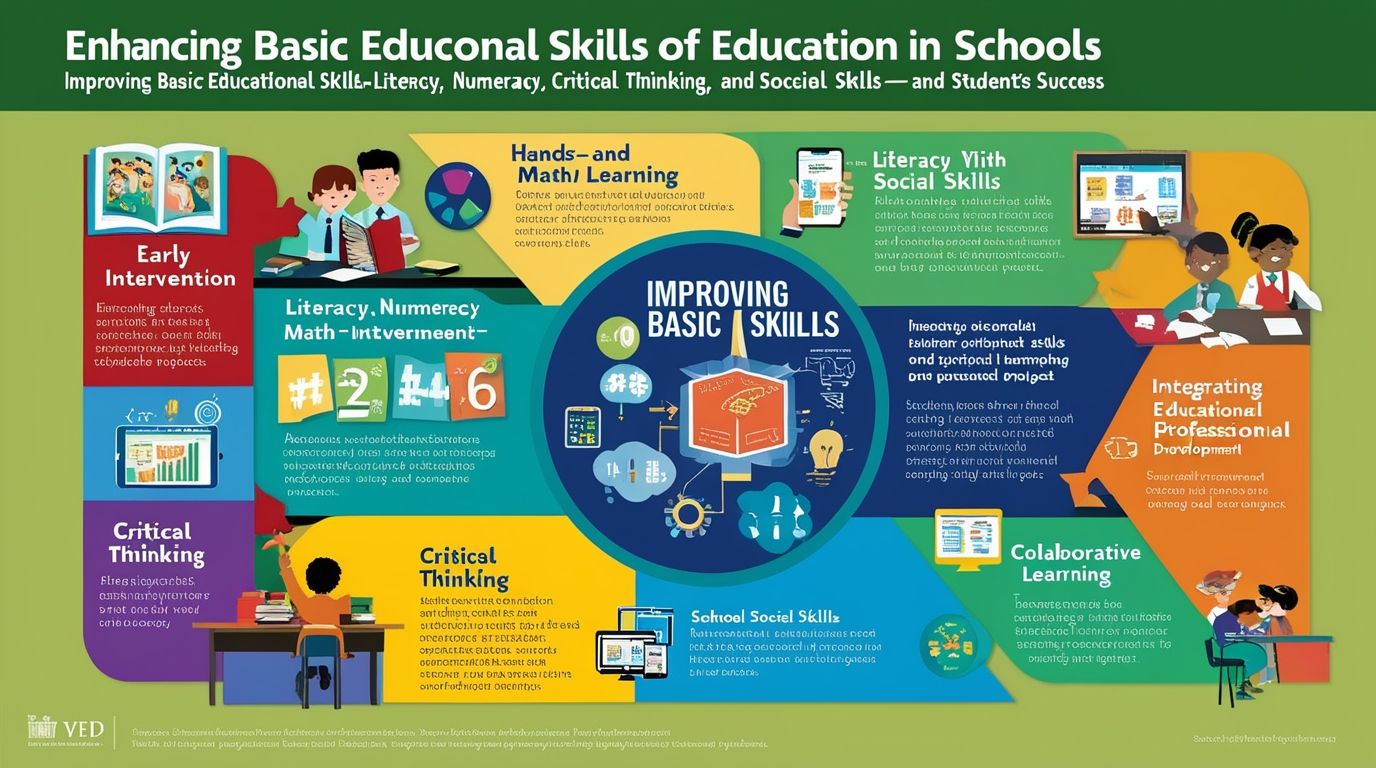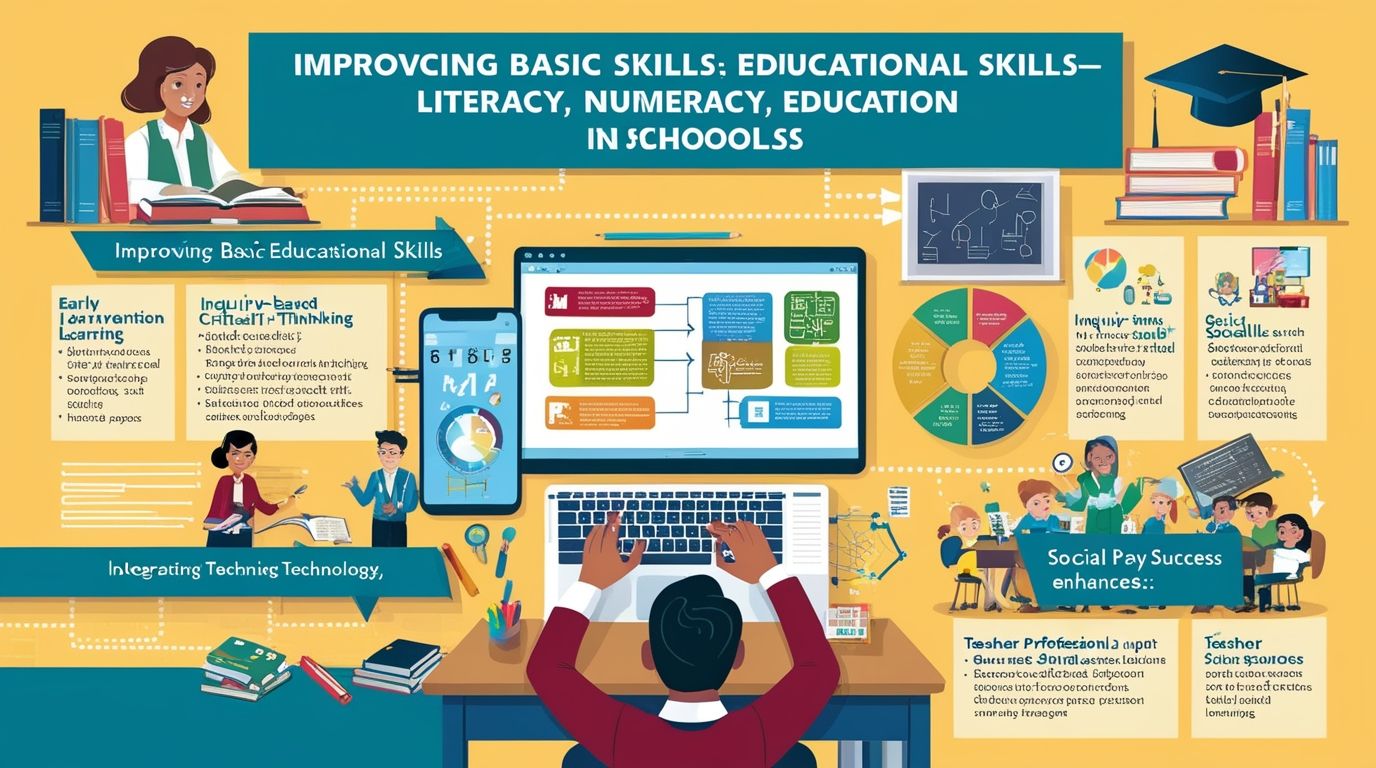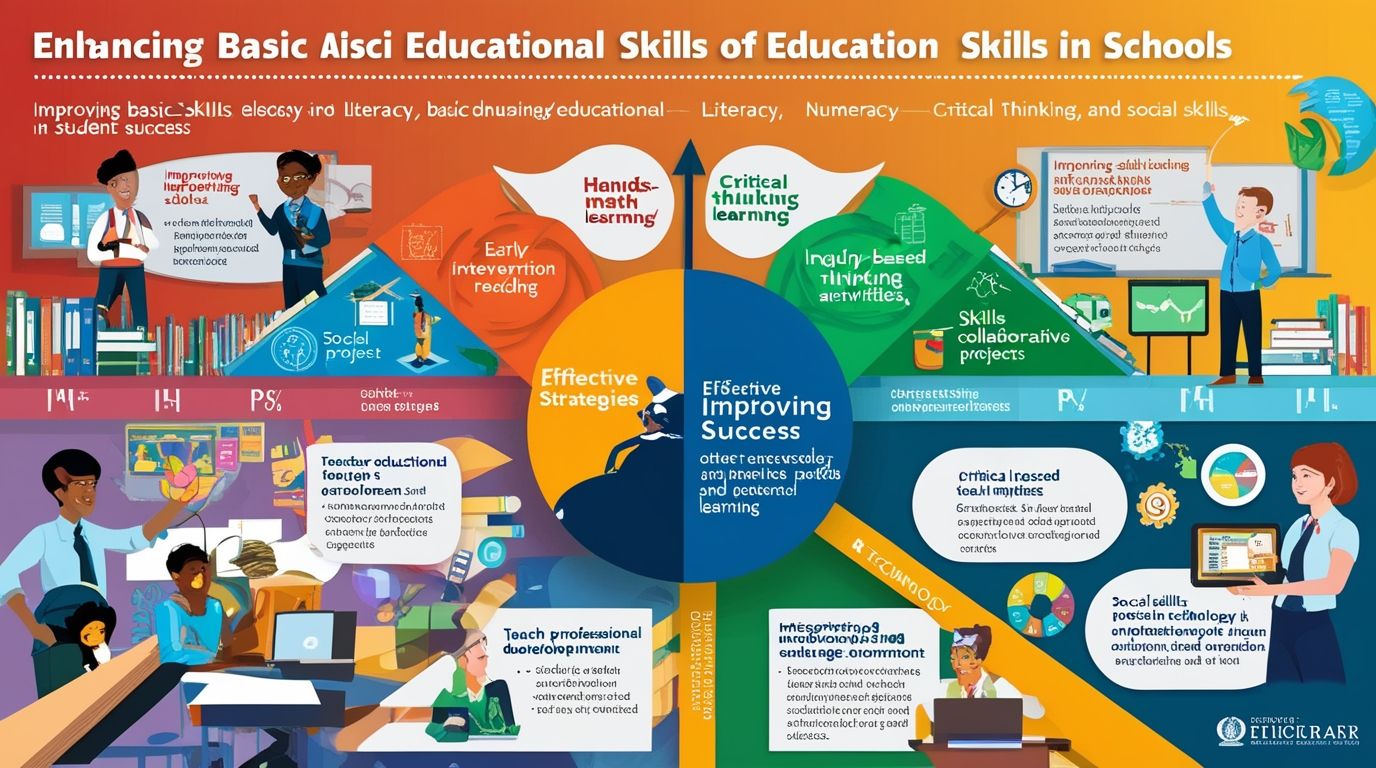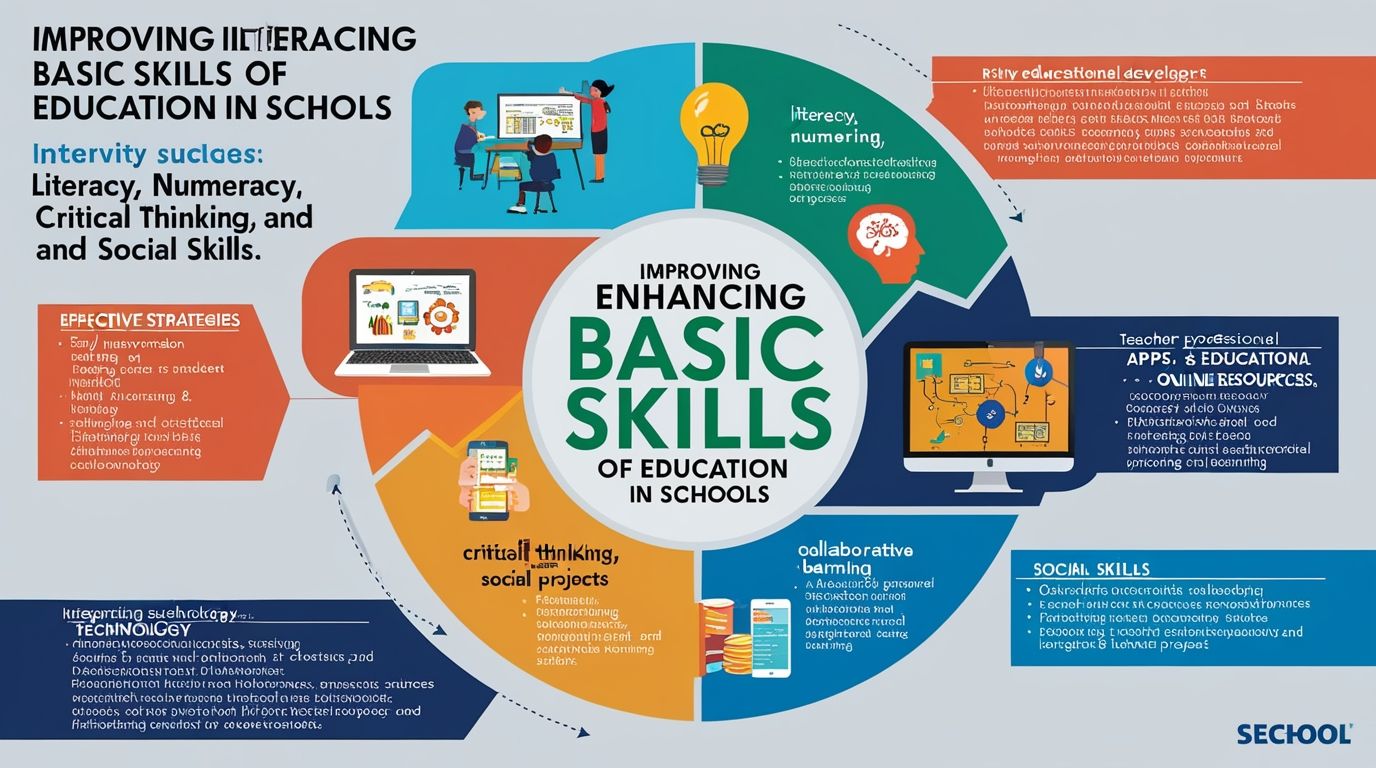Enhancing Basic Skills of Education in Schools, Education serves as the cornerstone of society, shaping the minds and futures of young individuals. As the world evolves, so must the methods and strategies used in education. Enhancing basic skills—literacy, numeracy, critical thinking, and social skills—is crucial for equipping students with the tools they need for personal and professional success. This article explores effective strategies and practices to enhance these foundational skills in schools.
1. Literacy Skills
Reading and Writing Proficiency
- Early Intervention and Phonics: Implementing phonics-based programs in early education can significantly boost reading skills. Phonics helps children understand the relationship between letters and sounds, forming the basis for reading fluency and comprehension.
- Reading Programs: Schools should adopt structured reading programs that include a variety of genres and levels. Encouraging daily reading habits through classroom libraries and reading circles can foster a love for reading.
- Writing Workshops: Integrate regular writing exercises that cover creative writing, essays, and reports. Feedback sessions where students can learn from their mistakes and improve their writing are essential.
- Literacy Across the Curriculum: Encourage teachers to incorporate reading and writing activities in all subjects. This not only enhances literacy but also helps students understand and retain content better.

2. Numeracy Skills
Mathematical Understanding and Application
- Hands-On Learning: Utilize manipulatives and visual aids to help students grasp abstract mathematical concepts. Tools like blocks, charts, and interactive apps can make learning math more tangible and engaging.
- Problem-Solving Approach: Emphasize problem-solving and critical thinking in math instruction. Encourage students to approach problems in multiple ways and to understand the underlying principles rather than just memorizing formulas.
- Real-World Applications: Show students how math is used in everyday life through projects and practical applications. This can include budgeting exercises, cooking measurements, or science experiments.
- Differentiated Instruction: Tailor math instruction to meet the diverse needs of students. This can involve grouping students by skill level, offering additional support or challenges, and using adaptive learning technologies. Enhancing Basic Skills of Education in Schools must be more active.
3. Critical Thinking Skills
Analyzing, Evaluating, and Creating
- Inquiry-Based Learning: Foster a classroom environment where questions and curiosity are encouraged. Use inquiry-based learning strategies that require students to investigate questions, gather information, and develop conclusions.
- Debates and Discussions: Incorporate debates, discussions, and Socratic seminars into the curriculum. These activities help students learn to articulate their thoughts, consider different perspectives, and develop reasoned arguments.
- Project-Based Learning: Engage students in projects that require them to apply their knowledge to real-world problems. This hands-on approach promotes critical thinking and collaboration.
- Teaching Metacognition: Help students understand their own thought processes. Teaching metacognitive strategies can empower students to plan, monitor, and evaluate their learning, leading to improved problem-solving skills.
4. Social Skills
Interpersonal Communication and Collaboration
- Collaborative Learning: Implement group projects and collaborative activities that require students to work together. This helps students develop teamwork, communication, and conflict-resolution skills.
- Social and Emotional Learning (SEL): Incorporate SEL programs that teach students to recognize and manage their emotions, develop empathy, and establish positive relationships. Activities like role-playing and peer mentoring can be effective.
- Extracurricular Activities: Encourage participation in extracurricular activities such as sports, clubs, and arts programs. These provide additional opportunities for students to interact, build friendships, and develop social skills.
- Positive Classroom Environment: Create a supportive and inclusive classroom atmosphere where students feel safe to express themselves and take risks. Establishing clear expectations and consistent routines can help maintain a positive environment.

Integrating Technology
Leveraging Digital Tools for Skill Enhancement
- Educational Software and Apps: Utilize educational software and apps designed to improve literacy, numeracy, and critical thinking. Interactive games, e-books, and math practice apps can make learning more engaging and personalized.
- Online Resources: Provide access to online resources such as Khan Academy, Coursera, and other educational platforms. These resources offer tutorials, practice exercises, and courses that can supplement classroom instruction.
- Blended Learning: Combine traditional teaching methods with online learning. Blended learning models, such as flipped classrooms, can give students more control over their learning pace and style.
- Digital Collaboration Tools: Use tools like Google Classroom, Microsoft Teams, and Zoom to facilitate communication and collaboration among students. These platforms can support group projects, virtual discussions, and peer feedback.
Teacher Professional Development
Continuous Improvement and Training
- Ongoing Training: Provide teachers with ongoing professional development opportunities focused on the latest educational research, teaching strategies, and technology integration.
- Peer Collaboration: Encourage teachers to collaborate, share best practices, and support each other through professional learning communities (PLCs) or mentorship programs.
- Reflective Practice: Promote reflective practice among teachers, where they regularly assess their teaching methods and student outcomes, and make adjustments as needed.
- Resource Access: Ensure teachers have access to high-quality instructional materials, technological tools, and support staff to implement effective teaching practices.

Parental and Community Involvement
Engaging Stakeholders in Education
- Parent Workshops: Offer workshops and resources to help parents support their children’s learning at home. Topics can include reading strategies, homework help, and fostering a positive learning environment.
- Community Partnerships: Develop partnerships with local businesses, organizations, and higher education institutions. These partnerships can provide additional resources, mentorship, and real-world learning opportunities for students.
- Volunteer Programs: Encourage community members to volunteer in schools, offering their time and expertise to support various programs and activities.
- Regular Communication: Maintain open lines of communication between the school and families through newsletters, meetings, and digital platforms. Keeping parents informed and involved in their children’s education can lead to better student outcomes.
Conclusion
Enhancing Basic Skills of Education in Schools, Enhancing the basic skills of education in schools is a multifaceted endeavor that requires a holistic approach. By focusing on literacy, numeracy, critical thinking, and social skills, and integrating technology and community involvement, schools can create an enriching and supportive learning environment. Continuous professional development for teachers and active engagement of parents and the community are also essential components of this process. Through these combined efforts, we can better prepare students for the challenges of the future, fostering a generation of well-rounded, capable, and confident individuals.

uofpl9
Mitolyn I really like reading through a post that can make men and women think. Also, thank you for allowing me to comment!
vn1u06
1wq9i6
You have remarked very interesting points! ps nice web site.
Whats up very nice website!! Guy .. Beautiful .. Amazing .. I will bookmark your website and take the feeds alsoKI’m satisfied to seek out numerous useful info here in the submit, we’d like work out more strategies in this regard, thank you for sharing. . . . . .
Temukan peluang menang besar di Shark Bounty : Slot Online Gacor yang Menjanjikan
Platform Slot Gacor yang Membayar Besar dan Tepat Waktu, hanya di SIGMASLOT
demais este conteúdo. Gostei bastante. Aproveitem e vejam este conteúdo. informações, novidades e muito mais. Não deixem de acessar para saber mais. Obrigado a todos e até mais. 🙂
Hello would you mind sharing which blog platform you’re using? I’m looking to start my own blog soon but I’m having a tough time choosing between BlogEngine/Wordpress/B2evolution and Drupal. The reason I ask is because your design and style seems different then most blogs and I’m looking for something completely unique. P.S Apologies for getting off-topic but I had to ask!
Heya i’m for the primary time here. I found this board and I to find It really helpful & it helped me out a lot. I’m hoping to offer one thing again and aid others such as you aided me.
I’ve read some just right stuff here. Definitely price bookmarking for revisiting. I surprise how a lot effort you set to make this type of great informative site.
You have brought up a very good details , thankyou for the post.
Hello! I could have sworn I’ve been to this blog before but after browsing through some of the post I realized it’s new to me. Anyways, I’m definitely happy I found it and I’ll be book-marking and checking back frequently!
Some really nice and utilitarian information on this website , also I conceive the design has got excellent features.
Thanks a lot for sharing this with all of us you actually know what you are talking about! Bookmarked. Kindly also visit my site =). We could have a link exchange agreement between us!
I’m usually to blogging and i really respect your content. The article has really peaks my interest. I am going to bookmark your web site and keep checking for brand new information.
I have recently started a web site, the information you provide on this site has helped me tremendously. Thanks for all of your time & work.
Nice post. I study something more difficult on totally different blogs everyday. It’ll all the time be stimulating to learn content from different writers and follow somewhat something from their store. I’d prefer to use some with the content material on my blog whether or not you don’t mind. Natually I’ll provide you with a hyperlink on your internet blog. Thanks for sharing.
You write with so much clarity and confidence. Impressive!
Magnificent site. A lot of useful information here. I’m sending it to a few friends ans also sharing in delicious. And certainly, thanks for your effort!